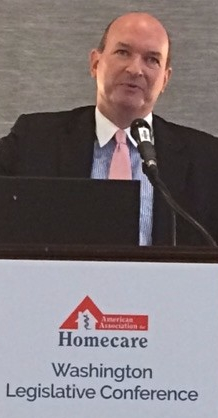 WASHINGTON, DC – Homecare advocates from across the country descended on Capitol Hill last week for the Washington Legislative Conference. The Association kicked off the conference with an announcement from Peter Thomas, ITEM Coalition coordinator (pictured), stating that the disability community is supporting H.R. 5210.
WASHINGTON, DC – Homecare advocates from across the country descended on Capitol Hill last week for the Washington Legislative Conference. The Association kicked off the conference with an announcement from Peter Thomas, ITEM Coalition coordinator (pictured), stating that the disability community is supporting H.R. 5210.
In a letter to Speaker of the House Paul Ryan and Minority Leader Nancy Pelosi, the ITEM Coalition states, “With the deadline looming, the ITEM Coalition has profound concerns that some of the most vulnerable Medicare beneficiaries are at risk of losing access to critical durable medical equipment and supplies. We urge Congress to act as expeditiously as possible.”
John Letizia, chair of the AAHomecare board, challenged attendees at the lunch to know two numbers, 30 and 36—thirty is the number of years providers have been coming to the Washington Legislative Conference to fight for homecare, and 36 are the number of days until the July 1 deadline.
“We need more time, be outraged. Have a chip on your shoulder, and focus on the beneficiary’s story,” said Tom Ryan, president of AAHomecare. His mantra resonated with the HME community who has seen cuts up to 50% since competitive bidding began. A common phrase heard throughout the day was, “I’m mad,” as attendees rallied and made visits to legislators offices throughout the day. During the Rural Panel, sponsored by MK Battery, John Gallagher of VGM, and Rose Schafhauser of MAMES, discussed how to address the challenges of serving patients in rural areas, and how to communicate these issues with patients and policymakers.
Patrick Naeger, president of MAMES and panelist member, explained that the number one issue his company faces is the distance between home base and the patients, as well as a lot of gravel roads. Naeger’s company covers 22 counties and tens of thousands of miles in Missouri. Rep Renee Ellmers (R-NC) encouraged attendees, saying: “I know who you are, I know what you do…I am a huge proponent of Dr. Price’s bill.” When asked for advice on speaking with legislators, Rep. Ellmers told providers to concentrate on the bills you are in support of, when talking to members of Congress, and explain that if the cuts take place on July 1, it will end up affecting access to care and cost more in the end. Rep Marsha Blackburn told attendees that the way you fix the access issue is through a market-based program that promotes choice and options for patients and consumers.
OIG Report Raises More Questions About CB Program
WASHINGTON, DC – The Office of the Inspector General (OIG) for the Department of Health & Human Services released a report last week that raises more concerns about CMS’ ill-conceived competitive bidding program for home medical equipment.
Looking at contract suppliers in Round 2 of the bidding program identified in complaints from the supplier community and congressional inquiries, the OIG focused on 146 unique contract suppliers that may not have been properly licensed in states requiring licensure for companies providing home medical equipment.
In that group, the OIG found that “63 suppliers did not meet licensure requirements for some of the competitions for which they received a contract. Additionally, 14 suppliers need to be further researched by CMS and its contractors to determine if they met or had not met licensure requirements.”
 “The fact that it took two years to get this report just solidifies our view that CMS can’t evaluate the patient impacts caused by recent deep cuts for rural providers in just six months before plowing ahead with a new round of cuts on July 1,” said Tom Ryan, president & CEO of AAHomecare. “That’s why we need Congress to step in and make CMS take the time they need to properly evaluate this program.”
“The fact that it took two years to get this report just solidifies our view that CMS can’t evaluate the patient impacts caused by recent deep cuts for rural providers in just six months before plowing ahead with a new round of cuts on July 1,” said Tom Ryan, president & CEO of AAHomecare. “That’s why we need Congress to step in and make CMS take the time they need to properly evaluate this program.”
“CMS has dragged its feet on implementing provisions passed in Congress last year that would require CMS to better enforce their own rules requiring that bidders are properly licensed in states requiring licensure,” Ryan continued. “This isn’t the way to run a program that impacts home medical equipment providers nationwide, and the millions of patients that depend on the essential products and care they provide.”
These revelations come as Congress considers legislation requiring CMS to better assess the direct impact of the recent round of price cuts for patients in rural areas before a new round of deep cuts take effect on July 1. Current Senate and House legislation, known in both chambers as the Patient Access to Durable Medical Equipment Act (S. 2736 and H.R. 5210), would delay the latest cuts for 15 months and require CMS to report their findings on patient access issues on a regular, transparent basis.
“The message is clear,” concluded Ryan. “The bidding program needs serious examination before it causes further disruption for both providers and patients.”
The OIG’s summary and full report can be found here.


